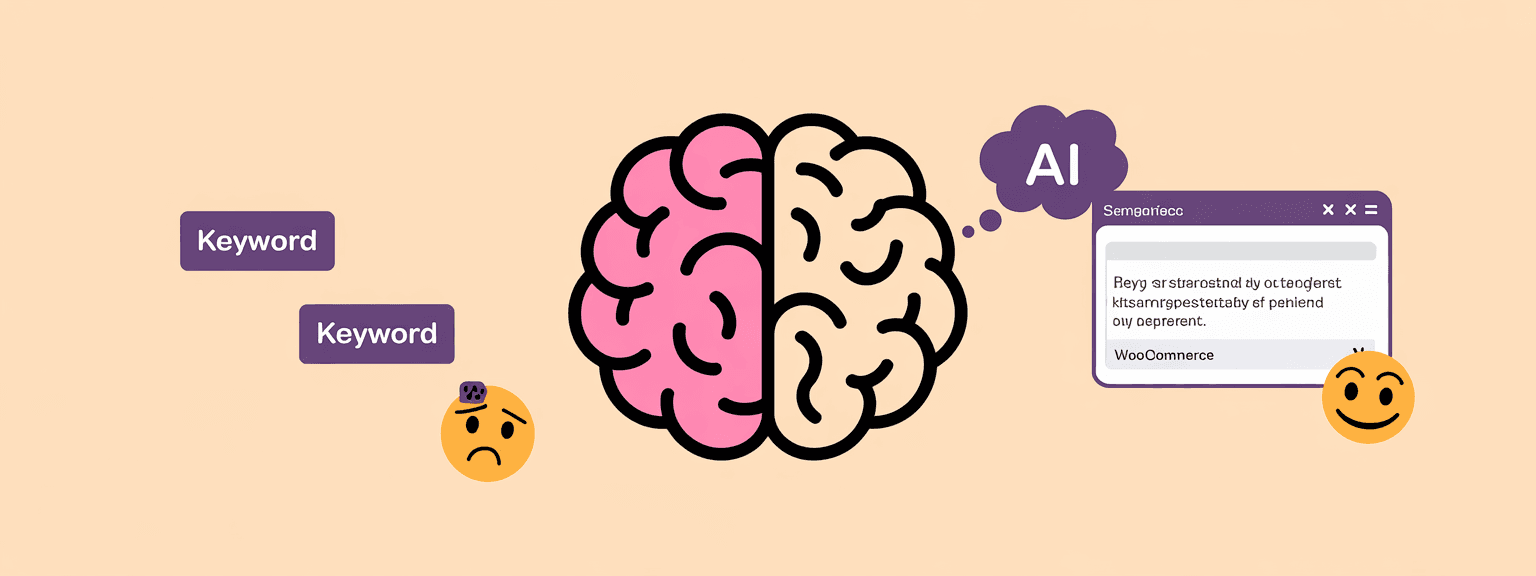
Beyond Keywords: Understanding Semantic Search for WooCommerce
Delve into the world of semantic search for WooCommerce and understand how it moves beyond basic keyword matching. Learn how understanding user intent, query context, synonyms, and leveraging NLP can dramatically improve product discovery, reduce 'no results' pages, enhance user experience, and boost conversion rates for your online store.
In the evolving landscape of e-commerce, simply matching keywords in your WooCommerce store's search bar is no longer enough to provide a truly effective customer experience. Shoppers use natural language, full of nuance, synonyms, and implied intent. This is where the concept of semantic search for WooCommerce comes into play, representing a significant leap forward in how online stores can understand and respond to customer queries. It’s about moving from a literal interpretation of words to a deeper comprehension of their meaning and context.
Imagine a customer searching for 'warm coat for snowy weather'. A traditional keyword-based search might look for products explicitly containing 'warm', 'coat', and 'snowy'. It might miss a perfectly suitable parka described as 'arctic-proof down jacket ideal for blizzards'. Semantic search technology, however, is designed to bridge this gap by understanding the *relationship* between words and concepts.
What Exactly is Semantic Search?
At its core, semantic search aims to improve search accuracy by understanding the searcher's intent and the contextual meaning of terms as they appear in the searchable dataspace, whether on the web or within a specific database like your WooCommerce product catalog. Instead of just matching strings of text, a semantic search engine considers:
- User Intent: What is the shopper truly trying to achieve or find? Are they looking to buy, compare, or learn?
- Query Context: The meaning of words can change based on the other words around them. Semantic search analyzes the entire query, not just isolated terms.
- Synonyms and Related Concepts: It recognizes that 'laptop', 'notebook', and 'ultrabook' refer to similar items. It understands that 'eco-friendly' and 'sustainable' carry similar connotations. This allows it to surface relevant products even if the exact keywords aren't used in the product descriptions.
- Natural Language Processing (NLP): This branch of artificial intelligence is crucial for semantic search, enabling machines to understand and process human language, including its complexities, ambiguities, and even common misspellings.
Why is Semantic Search Crucial for WooCommerce?
For a WooCommerce store, implementing semantic search capabilities can lead to a multitude of benefits:
- Drastically Reduced 'No Results Found' Pages: By understanding intent and synonyms, the search can find relevant products even when queries are imperfectly phrased. This keeps customers engaged rather than facing a frustrating dead end.
- Improved Product Discovery: Shoppers can find what they're looking for more easily, and even discover products they didn't know they needed, because the search intelligently connects their needs to your inventory. For example, a search for 'gifts for aspiring chefs' could surface high-quality knife sets, specialized cookbooks, or advanced kitchen gadgets.
- Enhanced User Experience (UX): A search that 'just gets' what the user means provides a smoother, more intuitive, and less frustrating shopping journey. This positive experience can lead to increased customer satisfaction and loyalty.
- Higher Conversion Rates: When customers quickly and easily find products that match their needs, they are far more likely to make a purchase. Semantic search directly contributes to guiding users down the conversion funnel more effectively.
The shift towards semantic search for WooCommerce is not just a trend; it's a fundamental improvement in how online stores can serve their customers. By focusing on meaning and intent, businesses can unlock a more intelligent and responsive product discovery process, ultimately leading to happier customers and better business outcomes. It’s about making your search bar a genuinely helpful assistant rather than a rigid, literal-minded gatekeeper.